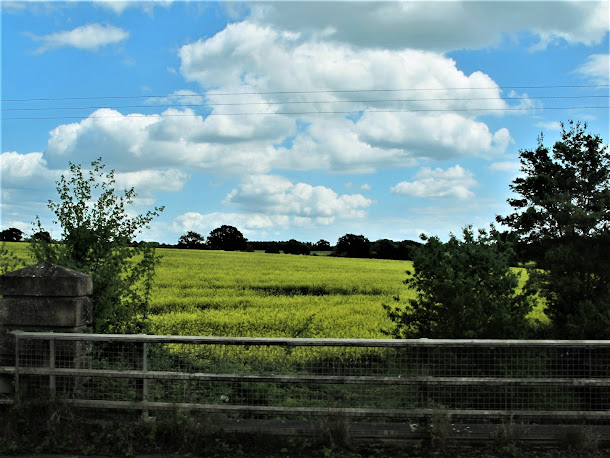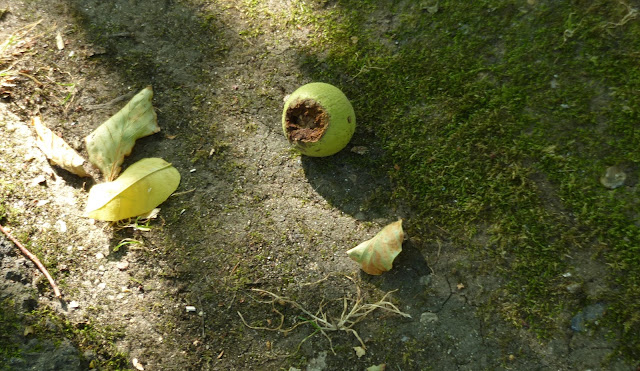Decided this morning to take action against the 'stir crazy' feeling that has developed around here. I checked the bus times online, decided I was going to miss the 10:09 so noticing there was a different bus at 10:24 strode manfully for that. It was not to be found. Instead the No 70 I was looking for is now a No 370. The 42B at 10:24 no longer appears to exist, according to the timetable on the shelter at the new bus station at any rate, so 370 it was to be.
The screen informed me the next 370 would be along in 9 minutes.
I believed them.
I was right to do so, 9 minutes later the bus pulled into the bay, the wrong bay, but into a bay. Not quite the 'Zimmer' bus as of old I note this one. This lot were more the ten different coloured pills a day lot I think. Anyway, we clambered aboard and slowly the bus made its way out of the terminus and wound round a new route to the far off city.
It being almost three years since I last ventured out this way I was as happy as a kid going on holiday. I expected to see change, and change there was. Many new housing developments have arisen. With a Tory controlled council it is no suprise to note these are all houses costing from £400,000 and rising, so as to bring in more Tory voters. I must admit a sense of growing discontent about this. Not that I can ever buy, but to purchase a one bed flat here requires about £18,000 deposit, and even then the mortgage people may not accept you. An actual cheap house may be found at the £300,000 mark, but unless you have one to sell, who can afford this?
Fifty or so minutes later we landed in town and I hastened slowly towards the Cathedral. There is nothing much else but shops in this town, and I wanted only one of them. I actually wished to look at the bookstall in here, and on this quiet day I found a lack of books, a mere smattering on the shelves. The Diocese office keeps the best ones in their bookshop. I was not going there.
I sat opposite this window, much brighter in reality than in this poor picture, the first time I have really noticed it. Somewhat Victorian to me. Just looking at it now I noticed a wee man high up on the left side. A closer look indicates this is Andrew, according to the cross he holds, and maybe next time I am in I will look again, and with the better camera.
I departed soon after I had mused sufficiently, hesitating when mistaken for an employee by a young lady entering the building. Have I sunk so low I actually look like an Anglican now?
Waterstones was the shop I was heading to. Here, my £20 gift voucher in hand, I perused each shelf, each table, and almost the Costa coffee shop before I noticed the prices, and, eventually making my purchase and discovering I had £10 on my Waterstones card also. This I will keep until the next time, probably next week and visit the Camoludunum shop.
In spite of the masses of books available I was a bit disappointed. None of them jumped out at me this time, however, after wandering around, almost shoving an unwilling to move woman from one table, and stopping a more polite one from moving at another, I managed to find three books to bring home to the bookshelves. As always it is a bit of a gamble, will these actually be worth someone else's money? Will I enjoy them? Will I find time to read them in between sloth and stuffing my face?
The trouble is, I only have one more book token to use, but there are several books I consider I ought to consider. Maybe I need to drop hints with the family again...?
Ridiculous as it sounds I almost went the wrong way heading back to the bus. Tsk! I intended to pass throught the market and check out one or two stalls. On the correct route I passed this. At first I thought it was the 'Wicker Man,' but it turns out to be a war memorial.
The memorial itself commemorates the Boer War, a massive block elsewhere remembers the Great War, but this one always has a presentation of sorts in November. Not sure what that is made from but it is well done.
I passed through the very large indoor market, obtaining a variety of meat from the butcher and accidentally purchasing two large slabs of cheese from the cheese stall. The nurse will not be pleased. It is a log time since I have been here, these two stalls have not changed, and many of the other stalls remain in place, including the one selling aged cameras at inflated prices.
Somewhat surprised at my energy I went to the bus station. At the stop the numbers indicated had changed. I queried this with a driver hesitating to begin his shift. He informed me how things had been revised, where my stop now was, and we both laughed when I asked why there was now a Number 70, as well as a Number 370 bus on the same routes. "I have no idea," he said holding wide his arms. We both laughed at the managers and clever people high up who direct things but never see them in action on the ground.
I checked the bus stop. Lots of old pill pushers stood there. The indicator claimed the No 70 was coming in 34 minutes, the C1 (what's that?) in 1 minute. I went to the 'Tesco Express,' bought an overpriced bottle of water, returned to the stop to find only a couple waiting. The C1 went off to the Hospital taking the pill pushers with it. Now the indicator said No 370 in 6 minutes. I sat of the two rails that form a poor seat and the No 370 drew in behind me!
Catching a bus takes lots of patience, exercise, sarcasm and hope in this area I find. Still, I was heading home.
What delight to see old houses (costing a million) blue sky, green grass, growing crops and hedges filled with birds flapping about. Though to be honest it was mostly Crows I heard murmering. It was good to be out, especially as the day passed quickly with no troubles. Within three hours I had returned, eaten lunch and began to stiffen up. A good day, which I will pay for tomorrow.




























